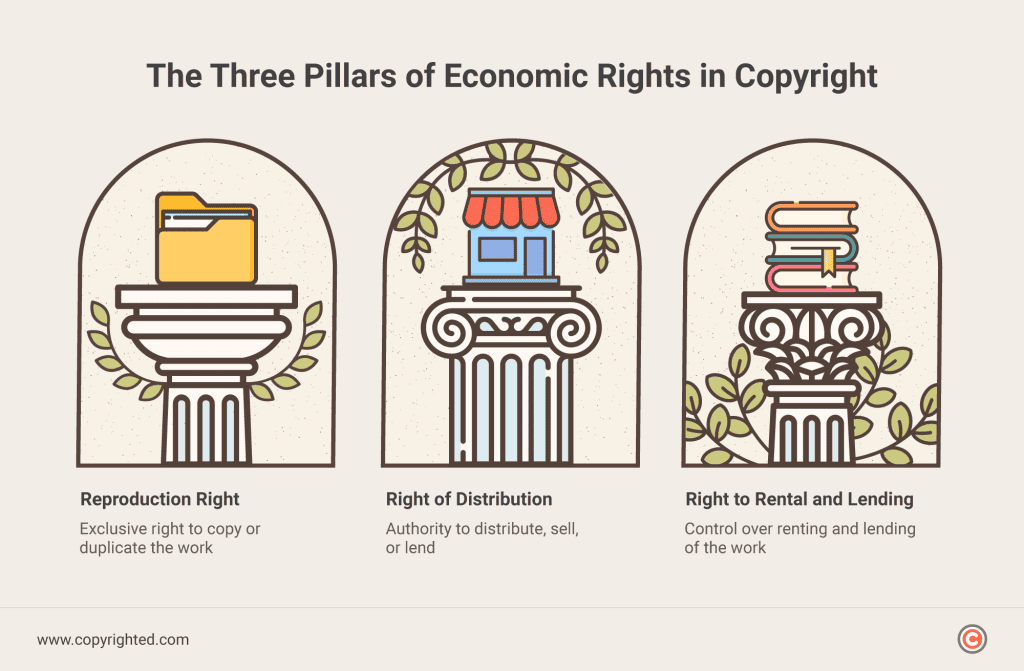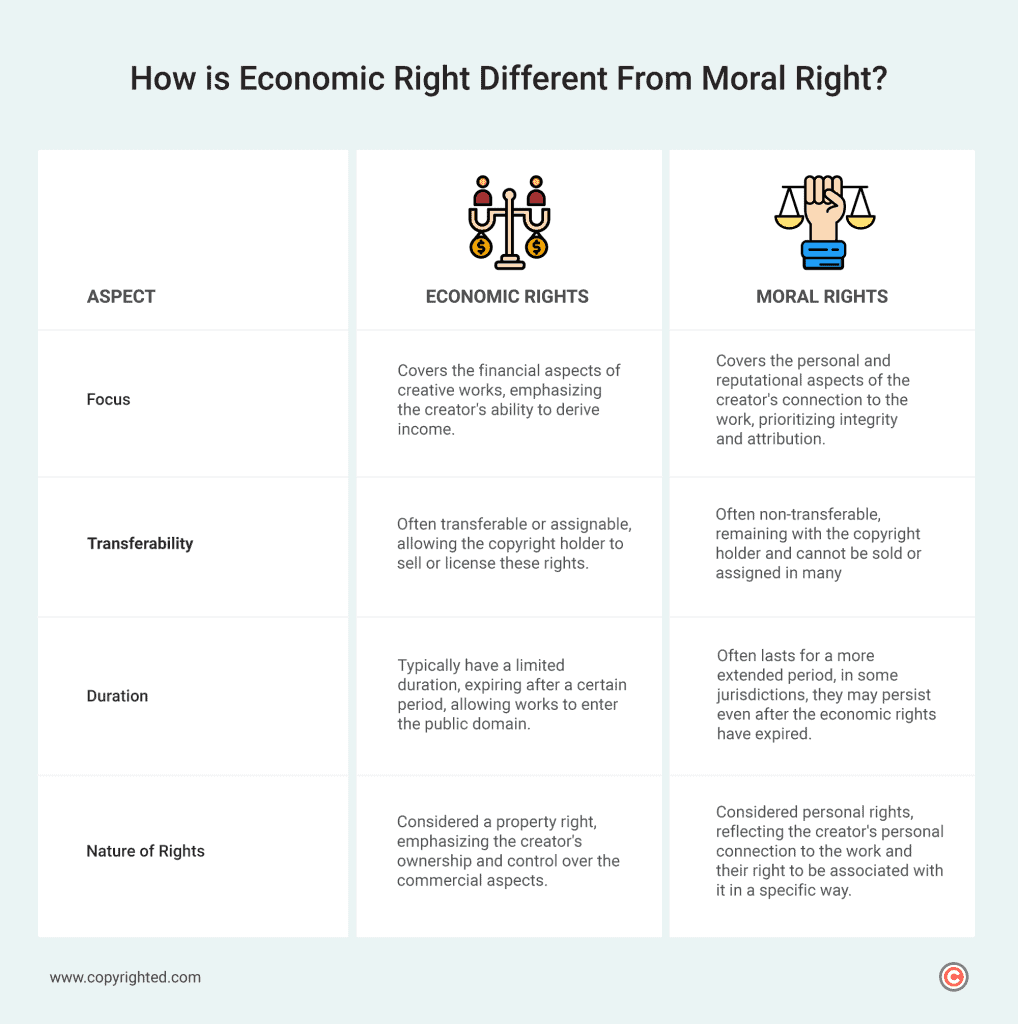Copyright grants creators numerous exclusive rights which are all important for protecting their intellectual property.
Among these rights, the economic right stands out as one of the most significant, providing creators with the means to monetize their creative works. This right empowers them to control the commercial aspects of their creations, influencing how their works are reproduced, distributed, and financially exploited.
However, another equally significant but sometimes overlooked aspect is moral rights, which relate to the personal and reputational connection a creator has with their work.
Collectively, economic and moral rights create a balanced framework that goes beyond financial considerations.
In this article, we’ll unpack both these rights, explaining their purposes, differences, and the critical roles they play in providing comprehensive protection to creators.
- Economic rights benefit content creators by giving them control over how their works are used and allowing them to monetize their creations.
- Moral rights aim to uphold the dignity and integrity of the creator’s connection to the work, regardless of who owns the economic rights.
- Economic rights are time-limited, and the duration of copyright protection varies by jurisdiction.
Table of Contents
What is Economic Rights in Copyright?
Economic rights in copyright pertain to the exclusive privileges granted to the owner of a copyrighted work, allowing them to control the economic aspects of that work. These rights are essential for creators to reap financial benefits from their creative endeavors.
These economic rights are designed to allow creators to control how their works are used and monetized. Copyright laws vary between countries, but these fundamental economic rights are recognized internationally through agreements such as the Berne Convention.
It’s important to note that economic rights are not unlimited and the duration of copyright protection varies by jurisdiction. Once the copyright expires, the work enters the public domain, and anyone can use it without permission.
This balance between protecting the rights of creators and promoting the public interest in accessing and using creative works is a central tenet of copyright law.
Considerations such as copyright commercial use further highlight the need to clearly define how works can be leveraged for business or financial purposes, ensuring creators are adequately compensated.
Three Economic Rights in Copyright

Copyright law grants creators certain exclusive economic rights to safeguard their creative works and ensure they can benefit financially from their work. In this context, three primary economic rights stand out: the Reproduction Right, the Right of Distribution, and the Right to Rental and Lending.
Let’s discuss each of these rights and understand their significance in upholding the financial well-being of creators.
Reproduction Right
The reproduction right is a fundamental economic right in copyright law that grants the copyright owner the exclusive authority to reproduce, duplicate, or copy the protected work. This includes the physical or digital replication of the work in various forms.
This is a significant aspect of protecting economic interests as it prevents unauthorized copying and reproduction, allowing creators to manage and benefit from the distribution of their content.
Right of Distribution
The right of distribution is another key economic right that copyright law gives content creators. This right provides copyright owners with the exclusive privilege to distribute, sell, rent, or lend copies of their work to the public.
It controls the initial dissemination of the work to consumers, allowing creators to regulate how their content enters the market. By holding this right, content creators can ensure that their work is made available to the public in a manner that aligns with their economic interests.
A related concept, the copyright first sale doctrine, can also play a role in how distribution rights evolve once a lawful sale has occurred, especially in the resale of physical media.
Right to Rental and Lending
The right to rental and lending is a specific economic right associated with certain types of works, such as audiovisual works.
This right grants the copyright owner the exclusive authority to control the rental and lending of copies of their work. It ensures that creators have a say in how their works are made available for temporary use or access, particularly in contexts like video rental stores or lending libraries.
In summary, these three economic rights – reproduction, distribution, and rental/lending – collectively give creators the ability to manage how their works are economically used.
How is Economic Right Different From Moral Right?
Economic rights and moral rights are two distinct aspects within the framework of copyright law, each serving different purposes and addressing varied concerns.
Economic rights in copyright primarily focus on the financial aspects of creative works. These rights grant creators exclusive control over the commercial aspect of their creations.
The primary goal of economic rights is to provide creators with the ability to monetize their works, ensuring they have control over how their intellectual property is used for financial gain.
In contrast, moral rights are more concerned with the personal and reputational aspects of a creator’s work. These rights are designed to protect the non-economic interests of the creator.
Moral rights often include the right to be recognized as the author, the right to integrity, and the right to decide when and how the work is disclosed to the public.
Moral rights aim to uphold the integrity of the creator, regardless of who owns the economic rights.
Here’s a comparison table highlighting the differences between economic rights and moral rights in the realm of copyright:

Economic and Moral Rights Under Copyright
In copyright, economic and moral rights work together to protect creators. These rights ensure that creators not only get paid for their works but also maintain a personal and dignified connection to what they create.
Economic rights constitute the financial backbone of copyright. By exercising economic rights, creators secure the means to derive income from their creative efforts, facilitating a sustainable environment for artistic expression.
Complementing economic rights, moral rights address the personal and reputational dimensions of a creator’s connection to their work.
Together, economic and moral rights create a balanced and holistic protection system. Economic rights enable creators to earn a living from their creative endeavors while moral rights contribute to the preservation of a creator’s identity.
Frequently Asked Questions
How do you enforce your copyright?
Copyright can be enforced through legal means. If you discover unauthorized use of your work, you can send a cease and desist letter or take legal action.
What happens if someone infringes on economic copyright?
If someone infringes on economic copyright, the copyright owner can take legal action. This may involve seeking damages, obtaining an injunction to stop the infringement, or pursuing other remedies provided by copyright law.
What is the economic theory of copyright law?
The economic theory of copyright law suggests that granting creators exclusive rights encourages the creation and dissemination of creative works.
Can economic rights be waived or forfeited by creators?
Yes, economic rights can be waived or forfeited by creators. They may choose to do so through contractual agreements, such as licensing their work for specific uses.
How do economic rights benefit content creators?
Economic rights benefit content creators by giving them control over how their works are used and allowing them to monetize their creations.


